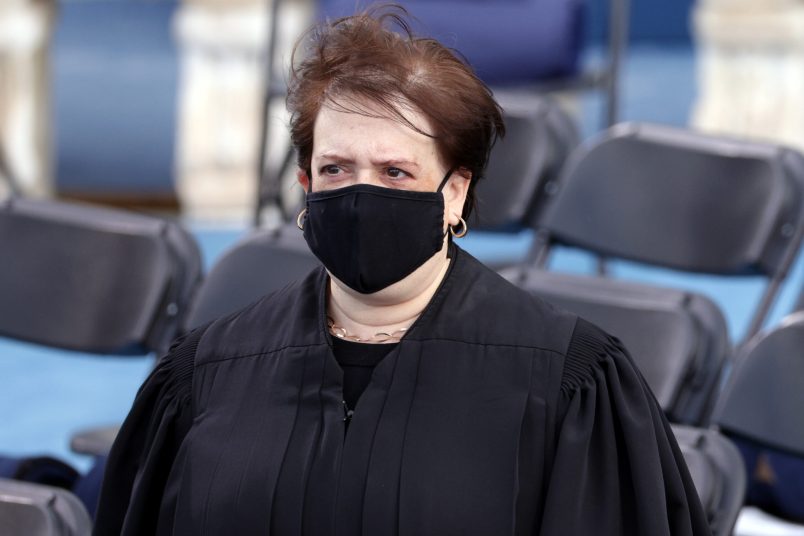In knocking down President Joe Biden’s student loan forgiveness plan, the right-wing Supreme Court majority does more than keep millions of American saddled with debt — it continues to shift enormous power away from Congress and the executive branch to itself.
The majority — “as is becoming the norm,” Justice Elena Kagan narrates in her dissent — relies heavily on the major questions “doctrine,” a theory in vogue in right-wing legal circles. It dictates that when executive branch agencies take action of major “economic and political significance,” they lose the usual judicial deference they enjoy. That standard of significance is wholly in the eye of the beholder — an amorphousness the majority has continually taken advantage of. That has usually translated, in the hands of this conservative Court, into various Biden administration actions meeting their doom.
While the Court often protests that it’s really shifting power back to Congress when it knocks down agency actions, it does so knowing that Congress is usually stalemated by various factors (split party control, the Senate filibuster) that make it extremely difficult for the legislature to pass many major laws.
It also disrupts the usual separation of powers balance: Congress writes broad laws authorizing agencies to deal with issues (letting the Environmental Protection Agency regulate air pollution or the Education Department deal with federal student debt), passing on the responsibility of crafting the specifics to the expert-staffed agencies. But this Court continues to impose itself on that process, deciding that Congress didn’t meet some vague standard of specificity in its delegation and knocking down agency actions it doesn’t like.
“This Court objects to Congress’s permitting the Secretary (and other agency officials) to answer so-called major questions,” Kagan writes, referring, in this case, to the Secretary of Education. “Or at least it objects when the answers given are not to the Court’s satisfaction. So the Court puts its own heavyweight thumb on the scales.”
This is more than just a constant barrier for Democratic administrations that seek to limit pollution, regulate workplace safety, shore up housing stability or mitigate ballooning student debt. It’s also an unprecedented power grab, as the unelected justices substitute themselves for the much more democratically accountable entities meant to decide and craft policy.
Kagan points out that Congress is directly elected by the people, and that agencies derive their power from the President.
“But this Court?” she asks incredulously. “It is, by design, as detached as possible from the body politic. That is why the Court is supposed to stick to its business — to decide only cases and controversies, and to stay away from making this nation’s policy about subjects like student-loan relief.”
In a footnote, Kagan points out that Justice Amy Coney Barrett’s concurrence includes beliefs that overlap with Kagan’s own about the limitations of major questions — perhaps a ground-softening attempt to win Barrett, who has some stated qualms about the doctrine, into the liberals’ fold on future decisions.
Chief Justice John Roberts, writing for the majority, seethes at Kagan’s candor, calling it a “disturbing feature” of recent opinions that the dissenting liberals have called out the Court’s appropriation of power.
In a thinly veiled warning, he says that a “misperception” that such criticisms are “disparagement” rather than “heartfelt disagreement” would be “harmful to this institution and our country.”
Kagan is unbowed by the reprimand to simmer down.
“Justices throughout history have raised the alarm when the Court has overreached — when it has ‘exceed[ed] its proper, limited role in our Nation’s governance,’” she responds. “It would have been ‘disturbing,’ and indeed damaging, if they had not. The same is true in our own day.”







But taking bribes is ok. Roberts is a real piece of work.
Second! Mebe. Go Judge Kagan! Call It. OUT! get it into the record. Each and EVERY time.
Roberts sounds like a mob boss here. “I don’t mind if you disagree with my suggestions, Lennie, but if you go public it sure sounds like you are disrespecting me. And where there is disrespect, there will be consequences.”
In short: right-wingers hate humanity.
“In keeping silent about evil, in burying it so deep within us that no sign of it appears on the surface, we are implanting it, and it will rise up a thousand fold in the future. When we neither punish nor reproach evildoers, we are not simply protecting their trivial old age, we are thereby ripping the foundations of justice from beneath new generations.” ― Aleksandr I. Solzhenitsyn, The Gulag Archipelago 1918–1956